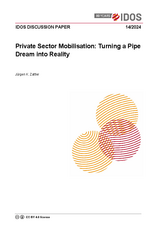Discussion Paper
Private sector mobilisation: turning a pipe dream into reality
Zattler, Jürgen K.Discussion Paper (14/2024)
Bonn: German Institute of Development and Sustainability (IDOS)
ISBN: 978-3-96021-239-3
DOI: https://doi.org/10.23661/idp14.2024
Price: 6 €
Achieving the United Nations Sustainable Development Goals (SDGs) and meeting global climate targets will necessitate unprecedented levels of investment, particularly in developing countries. A substantial portion of this investment must be sourced from the private sector, given the scale of the financial requirements and the limitations of public funding. Ever since gathering in Addis Ababa for the Third International Conference on Financing for Development in 2015, the international community has held lofty ambitions in this regard. The event set out to mobilise private sector investment on a scale of “billions to trillions”. So far, that aspiration has remained a mere pipe dream. For this to change, a greater focus needs to be placed on increasing the mobilisation rate (i.e., mobilising more private finance for each dollar of concessional finance). Further effort is also needed to establish a more enabling environment for private investment. In that respect, climate-related transformation offers the greatest opportunity. This approach is especially relevant for countries in fiscal and debt distress. This paper builds on experts’ recommendations which have converged in recent times. The G20 Independent Expert Group (IEG) emphasise that in emerging and developing economies (EMDEs), the essential building blocks on which markets are founded are often lacking. They argue for working more “as a system” by using all available support instruments coherently and by aligning this support as much as possible with the policies of partner governments. Experts also call for more efficient use of blended finance and smarter risk taking, for example by developing new (aggregated) financial products. While these proposals are crucial, some questions remain unanswered. In particular, the trade-offs are often not spelt out nor is it always clear what such proposals would mean for the business and operational models of development finance institutions (DFIs), encompassing corporate objectives, budgets, and incentive structures. This paper also outlines the main challenges linked to implementation, including how to function more “as a system” (e.g., between sovereign and non-sovereign lenders), how to align donors more closely with the policies and investment programmes of partner governments, and how to better balance blended finance approaches with the support for policy reforms enabling private sector investment. The paper explores how to use policy-based lending (PBL) more efficiently to improve market conditions (and avoid the building up of more debt through blended finance), how to strengthen blended finance policies, and how to increase the lending capacity of development banks through smarter risk taking. It is essential to acknowledge that the approach outlined in this paper is not intended as a prescriptive blueprint. While undoubtedly ambitious, it should be adopted selectively, based on available opportunities and specific country contexts. Nevertheless, the proposals presented in this paper warrant serious consideration and should be pursued wherever feasible. This paper outlines how shareholders can take these proposals forward in the boardrooms of national and, in particular, international development banks. The first step should be to foster dialogue with the relevant management teams to agree on an implementation plan.
Contact
Cornelia Hornschild
Publication Coordinator
E-mail Cornelia.Hornschild@idos-research.de
Phone +49 (0)228 94927-135
Fax +49 (0)228 94927-130
Alexandra Fante
Librarian/ Open Access Coordinator
E-Mail Alexandra.Fante@idos-research.de
Telefon +49 (0)228 94927-321
Fax +49 (0)228 94927-130



![[Translate to English:] Photo: Alexandra Fante, Bibliothekarin/Open Access-Koordinatorin](/fileadmin/_processed_/f/0/csm__c_Deutsches-Institut-fuer-Entwicklungspolitik_Fante_94ce4fa1ba.jpg)